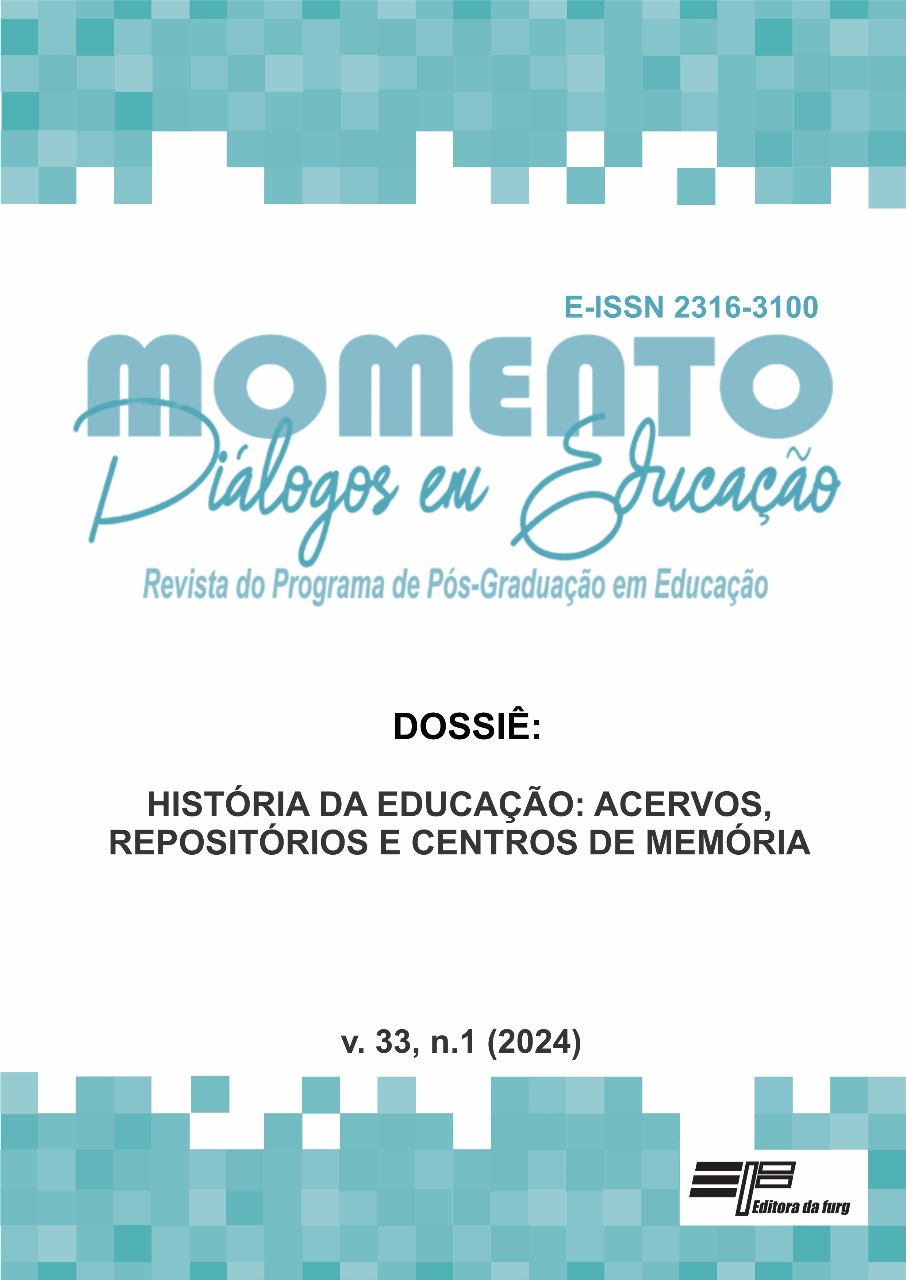A PLACE OF MEMORY FOR AFRO-BRAZILIAN CULTURE:
the case of the Instituto de Pesquisas e Estudos Afro-Brasileiros (Ipeafro)
DOI:
https://doi.org/10.14295/momento.v33i1.15762Keywords:
Digital collection, Antiracism, Decoloniality, Education, MemoryAbstract
Memory is an important tool for building a more equitable history that values the contributions of these groups to society. The Institute for Afro-Brazilian Research and Studies (Ipeafro) is an institution that acts as a decolonial memory centre for ethnic-racial relations. Therefore, we seek to answer the following question: how does the Ipeafro collection constitute a place of memory for Afro-Brazilian culture? It dialogues with the concepts of memory and decoloniality. The corpus of the research covers the material available in the collection, including texts, images and intellectual production, highlighting the trajectory and legacy of Abdias Nascimento in the process of creating Ipeafro. Through its research, studies and documents, Ipeafro seeks to decolonise thought and build a history that glimpses the perspectives and experiences of black people. In addition, Ipeafro promotes awareness-raising and socio-racial training actions, aiming to combat racism and ethnic-identity inequalities, helping, as far as it is concerned, to build a more inclusive narrative about the history of black people in Brazil, while valuing the culture and contributions of Afro-descendants to society. Ipeafro is therefore perceived as a decolonial memory house of resistance and black identity existence, and enables counter-colonial narratives about black people.
Downloads
References
CABRAL, A. A Cultura Nacional. In: ANDRADE, M. de (Org.) Obras escolhidas de Amílcar Cabral. A arma da teoria-unidade e luta I. Lisboa: Seara Nova, 2.ed. 1978.
CHARTIER, Roger. O mundo como representação. Estudos Avançados, 5(11), 173-191. Recuperado de https://www.revistas.usp.br/eav/article/view/8601 DOI: https://doi.org/10.1590/S0103-40141991000100010
CHAUÍ, Marilena. Convite à filosofia. São Paulo: Ática, 2000
Fórum Social Mundial 2018. In: FÓRUM SOCIAL MUNDIAL de 2018, Salvador/BA (Anais). Disponível em: https://wsf2018.org/wp-content/uploads/2020/10/Relat%C3%B3rio-FSM-2018 acessado em: 04/03/2023
HALBWACHS, Maurice. A memória coletiva. Tradução de Beatriz Sidou. 2ª ed. São Paulo: Centauro, 2013.
ITAÚ CULTURAL, IPEAFRO, ELISA LARKIN NASCIMENTO E VINICIUS SIMÕES. Ocupação Abdias Nascimento. Disponível em: https://www.itaucultural.org.br/ocupacao/abdias-nascimento. Acesso em: 9 mar. 2023. DOI: https://doi.org/10.4324/9781003159247-65
LE GOFF, Jacques. História e memória / Jacques Le Goff; tradução, Bernardo Leitão. [et al.] -- Campinas, SP, Editora da UNICAMP, 1990.
MARCEDO, Fábio e AREND, Silva. Sobre a História do Tempo Presente: Entrevista com o historiador Henry Rousso. Florianópolis, v. 1, n. 1, p. 201 – 216, jan. / jun. 2009.
MARTINS, Leda. Afrografias da memória: o reinado do Rosário do Jatobá. 1.ed. Belo Horizonte: Mazza Edições; São Paulo: Editora Perspectiva, 1997.
Mignolo, Walter D. Histórias locais / projetos globais: colonialidade, saberes subalternos e pensamento liminar / Walter D. Mignolo; tradução de Solange Ribeiro de Oliveira. 1. ed. rev. – Belo Horizonte: Editora UFMG, 2020.
NASCIMENTO, Abdias. Dramas para negros e prólogo para brancos. Rio de Janeiro: Teatro Experimental do Negro, 1961.
NASCIMENTO, Abdias. Orixás: os Deuses Vivos da África/ Orishas: the Living Gods of Africa in Brazil. Rio de Janeiro/ Philadelphia: Instituto de Pesquisas e Estudos Afro-Brasileiros/Temple University Press, 1969. Disponível em: https://ipeafro.org.br/acervo-digital/documentos/man-exposicoes-de-abdias/malcolm-x-house/ acessado em: 10/03/2023
NASCIMENTO, Abdias. Os Orixás – Os Deuses Vivos da África. Pinturas e poesia de Abdias Nascimento/ Organizadora, Elisa Larkin Nascimento. Brasília: IPEAFRO e Fundação Cultural Palmares, 2006. Disponível em: https://ipeafro.org.br/acervo-digital/leituras/orixas-deuses-vivos-da-africa/ acessado em: 11/03/2023
NASCIMENTO, E. L. Instituto de Pesquisas e Estudos Afro-brasileiros (Ipeafro). Disponível em: <https://ipeafro.org.br/acervo-digital/>. Acesso em: 1 mar. 2023.
NASCIMENTO, Elisa. L A África na Escola Brasileira. 2.º ed. Ipeafro. Rio de Janeiro, 1993. Disponível em: https://ipeafro.org.br/acervo-digital/leituras/publicacoes-do-ipeafro/a-africa-na-escola-brasileira/ acessado em: 05/03/2023
NASCIMENTO, Elisa. L. Coleção Sankofa - Matrizes Africanas na Cultura Brasileira. Elisa Larkin Nascimento (org.). Editora Selo Negro, 2008
NASCIMENTO, Elisa. L. Fórum Social Mundial. (2018) Fórum Social Mundial – Resistir é Criar. Resistir é transformar. Salvador. BA, 2018. Disponível em: https://ipeafro.org.br/acoes/ipeafro-no-forum-social-mundial-2018/ acessado em: 04/03/2023
SANTOS, Antônio. C. (Vovó do Ilê). NASCIMENTO, Elisa. L. Ilê Aiyê – Canto negro: América negra “o sonho africano” Livro de canções do Ilê Aiyê referentes aos anos de 1989 a 1993.IPEAFRO, 1993. Disponível em: https://ipeafro.org.br/acervo-digital/documentos/movimento-negro/ acesso em: 03/03/2023
Downloads
Published
How to Cite
Issue
Section
License
Copyright (c) 2024 Momento - Diálogos em Educação

This work is licensed under a Creative Commons Attribution 4.0 International License.
À Revista Momento − Diálogos em Educação, ficam reservados os direitos autorais, de todos os artigos nela publicados.


